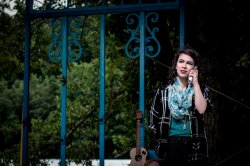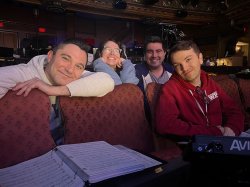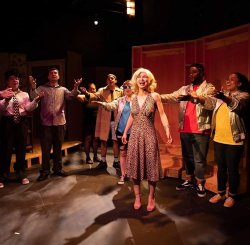Nicole D’Angelo ’17: Breaking Barriers on Broadway
How a mistake landed an autistic actor-musician and Montclair graduate the roles of a lifetime
Posted in:

Nicole D’Angelo ’17 recalls her excitement over a callback for a starring role in the groundbreaking, neurodivergence-centered Broadway musical How to Dance in Ohio. However, she misread the email and missed her callback deadline.
“I was absolutely devastated. I kicked myself for weeks,” says D’Angelo, who felt she had so much in common with the character Marideth, including her strong dislike of shoelaces.
While she didn’t get the part, D’Angelo played a much bigger role in the landmark production, which made history by virtue of autistic actors playing autistic characters onstage. The show also employed many autistic people, including D’Angelo, backstage. “We’ve got autistic people everywhere,” she says, smiling. She first joined the show as music assistant but right before it opened on Broadway, she was promoted to assistant music director. In addition, D’Angelo counts among her credits, script consultant and member of the Access Team.
It was D’Angelo’s initial virtual audition, during which she sang her own version of “I Speak Six Languages” from the 25th Annual Putnam County Spelling Bee, that led to her Broadway music role. She rewrote the lyrics to “I Play Six Instruments,” and was able to show off her musical talent by playing only six of the more than 20 musical instruments she plays. “They were able to see my acting and my singing but also my playing,” she says.
“Though I would still love to play Marideth one day, I love that I wound up being able to assist in the creation of the show, because there surely will be future productions but the show is only written once,” D’Angelo says. “Besides, now many of my quirks and massive sensory issues with food [‘a hater of pickles’] have made it into Marideth’s character, so she fits me even better.”
A passionate advocate for autistic people, D’Angelo is especially proud of the advocacy and educational roles included in the script, as well as making the show accessible to everyone. From sound levels and toned-down lighting to cool-down spaces and sensory bags with fidget toys, sunglasses and headphones, the access team tried to cover every detail to make the show accessible and sensory-friendly for audience members. While much media coverage has focused on that and the feel-good aspects of the autistic actors/characters, D’Angelo’s and other advocates’ goals were to represent and inform. As the script consultant, she helped to shape the show’s language.
“This is a piece of advocacy. We take a very strong stance against these tropes in our show,” she says. “It’s my favorite part of the show that we’re able to address something that we know in the disability community to be called ‘inspiration porn,’ which is media that basically uses disabled people to make non-disabled people feel better about themselves or it centers non-disabled people in disabled stories.”
D’Angelo says she hopes people are inspired by the subject and not the autistic actors. “Saying, ‘These people are so inspiring for putting themselves out there on stage’…you wouldn’t say that about a neurotypical actor,” she notes. Instead, her hope is that people will leave the show with a desire to learn more about autism or be equipped to have conversations about autism and with autistic people.
“The whole neurodiversity movement is about celebrating these differences and not hiding them in the way that is still the narrative around autism, and our show is a really great example of not hiding; we put it all out there,” she says. “We’ve had an incredible response from autistic people who have seen it, from parents of autistic kids who’ve seen it and from people who came in not knowing anything about autism.”

That D’Angelo landed in a Broadway production did not come as a surprise to her professors at Montclair’s John J. Cali School of Music, from which she graduated with a Bachelor of Arts in Music Education.
“Nicole is the kind of musician who raises the level of any ensemble because of a highly developed musical awareness and the ability to adapt to any musical situation or environment,” says the Cali School’s Director of University Bands Thomas McCauley. “Nicole, even as an undergraduate student, was a highly motivated, multi-faceted musician. Nicole is, of course, a wonderful pianist but also played fantastic clarinet and bass clarinet in our Montclair Wind Symphony.”
Cali School Coordinator of Music Education Marissa Silverman says she was lucky to have D’Angelo not just as a student but also in a chamber ensemble. “As a teacher, I have never met anyone who has such a love for her learning and is equally passionate about music and the betterment of others,” says Silverman. “On many occasions, I discussed Nicole’s interests in reaching special needs students, particularly those with autism. At that point in time, Nicole wanted to someday open up a music school for special needs students. This admirable, caring and socially responsible goal paved the way for Nicole’s work on How to Dance in Ohio. Full circle, indeed.”
Montclair was the only university to which D’Angelo applied. Her parents are alumni, among Montclair’s first computer science graduates in the 1980s, and it was also the only university with a bass clarinet concentration. It was her instrument of choice then because she doubted her piano-playing abilities but after auditioning, she was encouraged to focus on piano.
“I really wanted to do music therapy so I could work with autistic people like myself,” D’Angelo says, adding she had to decide whether to “use music education therapeutically or use music therapy educationally. I decided what I really wanted to do was teach music and have therapeutic effects in that way, so I switched to music education and piano because I realized I was good enough.”
After graduating from Montclair in 2017, D’Angelo taught piano, teaching more than 50 students per week at one point. She also auditioned to join symphonies but soon realized that wasn’t her calling.
She recalled her love for musical theater while at Montclair but “I didn’t even consider that could be a career path,” thinking “this is way too fun to be a job,” she says. D’Angelo decided to pursue acting and voice lessons instead. She joined EPIC Players, a Brooklyn-based “neuro- inclusive theater company,” and has worked in various capacities in more than 150 theater productions, primarily as a music director or pit musician. She won several starring roles, including Audrey in the off-off-Broadway production of Little Shop of Horrors and Tilly in a virtual production of She Kills Monsters: Virtual Realms.

“That was about five or six years ago, and I have not looked back since,” D’Angelo says. “I did a whole bunch of work with them [EPIC Players]. I also got to hone my advocacy skills.”
In addition, in 2021, D’Angelo launched an Etsy shop for handmade Broadway costumes for teddy bears three years ago. She’s made and sold mini-Hamilton bears, Elizabeth Schuyler Bear (“Eliza Schuybear”) and Baby Jenna Bear inspired by Sara Bareilles’ Waitress.
As for her autism, D’Angelo says she self-diagnosed after reading Look Me in the Eye: My Life with Asperger’s by John Elder Robison. Everything, from her sensory issues to her disdain for shoelaces and shoes, suddenly made sense. She says she tried to get an autism diagnosis from doctors and therapists but was dismissed as “too social,” having “too many friends” or “too smart or gifted” to be autistic.
“I never really made it through the formal diagnosis process because nobody took me seriously,” she says. “Autism causes sensory issues. I’ve always had problems with loud noises. I’ve had problems with fabrics. Everything just clicked when I read about that, and so I knew that was it.”
D’Angelo says her mother recently reminded her that she would recoil during ultrasound appointments. “Even in utero, I didn’t like to be touched,” she says laughing.
Her advocacy work was born from that experience. “It sparked for me an interest in putting myself out there and being like, no, this is also what autism can look like. You have an idea of what it can be but also this is what it can be, and what I know to be true is valid.”
A former blogger, D’Angelo is very involved in social media advocacy. “I’m putting my ideas out there, so people can see them.”
D’Angelo says she’ll continue to advocate and educate. “The thing that has been pervasive and that I’m still continuing to have to educate people about is that for us, it’s such an integral part of our identity,” she says. “So much of the narrative around autism makes it seem as if autism is inherently a bad thing. It’s just a thing. It’s a thing, and it’s challenging, but I wouldn’t see the world the same way if I wasn’t autistic.
“There’s no place where autism ends and Nicole begins.”
Story by Staff Writer Sylvia A. Martinez.
Note: How to Dance in Ohio has announced its closing on February 11.
